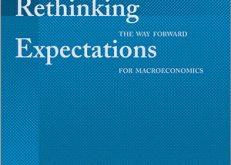Ett av Skolkommissionens övergripande förslag är att i skollagen ange att skolans huvudmän ska verka för en allsidig social sammansättning. Efter att ha konstaterat att utvecklingen mot ökade socioekonomiska skillnader mellan skolor är mycket oroande, avstyrker emellertid Skolverket förslaget. Orsaken är att det anses oklart vad ”allsidig social sammansättning” innebär. Det kan man anse, men då måste man också undra om inte även Skolverkets oro för ökade socioekonomiska...
Read More »Where modern macroeconomics went wrong
Where modern macroeconomics went wrong DSGE models seem to take it as a religious tenet that consumption should be explained by a model of a representative agent maximizing his utility over an infinite lifetime without borrowing constraints. Doing so is called micro-founding the model. But economics is a behavioral science. If Keynes was right that individuals saved a constant fraction of their income, an aggregate model based on that assumption is...
Read More »Rethinking expectations
The tiny little problem that there is no hard empirical evidence that verifies rational expectations models doesn’t usually bother its protagonists too much. Rational expectations überpriest Thomas Sargent has defended the epistemological status of the rational expectations hypothesis arguing that since it “focuses on outcomes and does not pretend to have behavioral content,” it has proved to be “a powerful tool for making precise statements.” Precise, yes, but relevant and...
Read More »I welcome their hatred
I welcome their hatred [embedded content] div{float:left;margin-right:10px;} div.wpmrec2x div.u > div:nth-child(3n){margin-right:0px;} ]]> Advertisements
Read More »Breakfast in America
[embedded content] div{float:left;margin-right:10px;} div.wpmrec2x div.u > div:nth-child(3n){margin-right:0px;} ]]> Advertisements
Read More »Håll mitt hjärta
[embedded content] Whoo så bra. Slår till och med originalet! div{float:left;margin-right:10px;} div.wpmrec2x div.u > div:nth-child(3n){margin-right:0px;} ]]> Advertisements
Read More »The Letter
[embedded content] div{float:left;margin-right:10px;} div.wpmrec2x div.u > div:nth-child(3n){margin-right:0px;} ]]> Advertisements
Read More »The scar deep inside
The scar deep inside [embedded content] div{float:left;margin-right:10px;} div.wpmrec2x div.u > div:nth-child(3n){margin-right:0px;} ]]> Advertisements
Read More »What makes economics a science?
What makes economics a science? Well, if we are to believe most mainstream economists, models are what make economics a science. In a recent Journal of Economic Literature (1/2017) review of Dani Rodrik’s Economics Rules, renowned game theorist Ariel Rubinstein discusses Rodrik’s justifications for the view that “models make economics a science.” Although Rubinstein has some doubts about those justifications — models are not indispensable for telling good...
Read More »Küssen kann man nicht alleine
Küssen kann man nicht alleine [embedded content] div{float:left;margin-right:10px;} div.wpmrec2x div.u > div:nth-child(3n){margin-right:0px;} ]]> Advertisements
Read More » Lars P. Syll
Lars P. Syll




